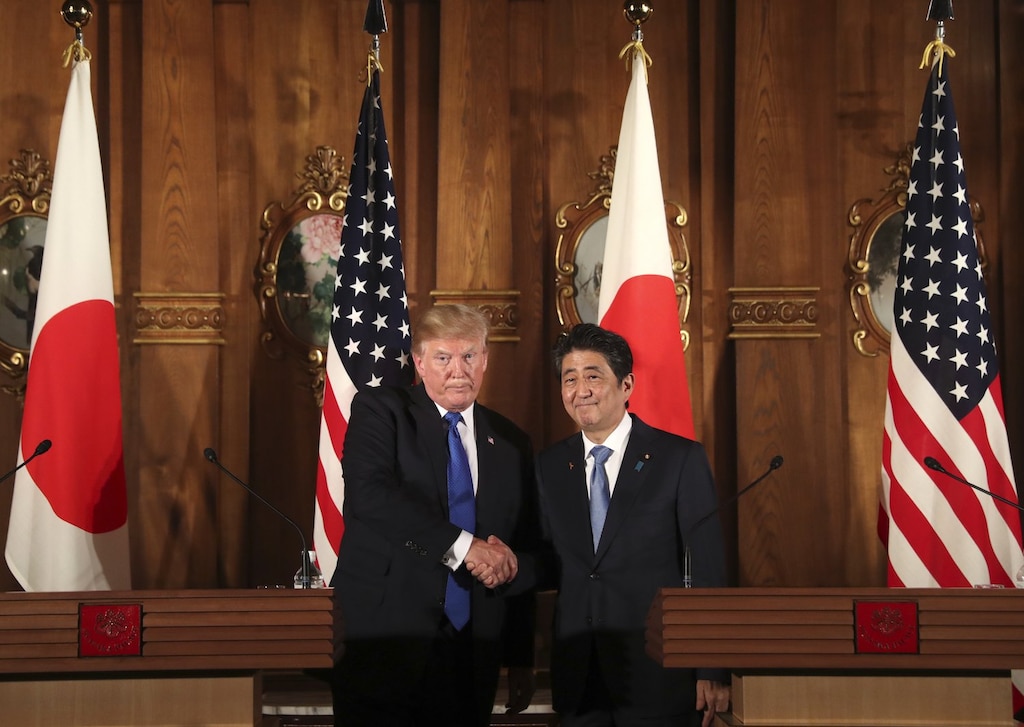 Andrew Harnik/Associated Press
Andrew Harnik/Associated Press
- President Donald Trump signed a final trade agreement with Japan on Monday.
- The deal would reopen some of the markets farmers had lost access to after the US withdrew from a multilateral Asia-Pacific pact in early 2017.
- But critics have said it only recovered a portion of the benefits from the Trans-Pacific Partnership, a now 11-country trade agreement Trump withdrew the US from within his first week in office.
- Visit Business Insider’s homepage for more stories.
President Donald Trump signed a final trade agreement with Japan on Monday that would reopen some of the markets farmers had lost access to after the US withdrew from a multilateral Asia-Pacific pact in early 2017.
“I think we’re at a stage with Japan where our relationship has never been better than it is right now,” Trump said at a press conference in the Roosevelt Room, portraying the deal as a major win for farmers and ranchers.
US officials estimated the deal would reduce tariffs for roughly $7 billion worth of American agricultural products including cheese, wine, beef, pork, wheat, and almonds. The US would in turn lower tariffs on Japanese industrial goods under the agreement, which would also set stricter terms for digital trade between the two sides.
But critics have said it only recovered a portion of the benefits from the Trans-Pacific Partnership, a now 11-country trade agreement Trump withdrew the US from within his first week in office.
“Why we’d walk away from that in order to take this is beyond me,” Senator Tom Carper, a Democrat from Delaware and a ranking member of the Environment and Public Works Committee, said on Bloomberg TV last month. “Is it better than nothing? It is. But it’s not even close to the Trans-Pacific Partnership.”
The agreement did not touch on current auto tariffs or additional ones that Trump threatened Japan with last year on the basis of national security concerns. Japanese Prime Minister Shinzo Abe has said he was assured the country would be spared from such measures, but that was not explicitly laid out in the text.
“It certainly is the Japanese ambition to have car tariffs be discussed,” US Trade Representative Robert Lighthizer said in a call with reporters after the deal was reached. “But at this point, it’s not part of this agreement.”
The Trump administration has increasingly sought to placate farmers, who have suffered financial losses from broader tariff disputes with China and other trading partners. After a separate World Trade Organization decision last week, the US said it would hit the European Union with tariffs on agricultural items and hundreds of other imports.
While Trump has found support in calls to address Chinese trade practices seen as unfair, critics warned American allies should be involved in that process. The president has separated himself from that approach in office as he withdrew from deals like the TPP and slapped metal tariffs on the EU and elsewhere.
“Bigger picture, as we sign these deals with our largest trading partners — Japan, USMCA, EU — it puts increasing pressure on China to ink a deal with us,” said Dave Walton, a soybean farmer in Iowa. “They do so by making China see them as competitors for our trade.”
The agreement was announced on a preliminary basis in August. On the sidelines of the United Nations General Assembly in New York last month, the US and Japan signed an agreement-in-principle. The move on Monday afternoon concluded the final text of the deal.













